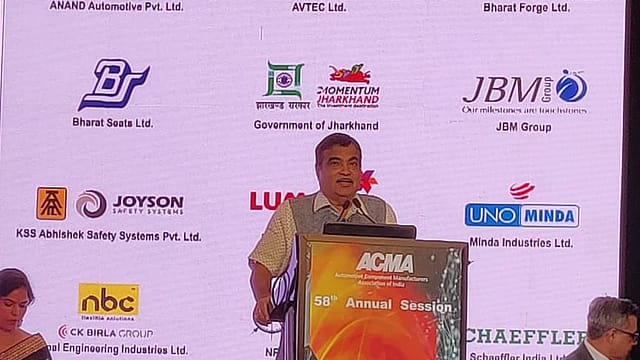Methanol and other alternative fuels an urgency: Nitin Gadkari
ADVERTISEMENT

Union road transport and highways minister Nitin Gadkari said on Wednesday he wasn’t against petrol and diesel vehicles but felt India urgently needed to adopt alternative fuels such as methanol to reduce pollution levels.
His comments suggested a softening of his stance after he sparked controversy last year when he threatened to “bulldoze” auto companies if they failed to produce cars driven by alternative fuels by 2030.
“Last year, a lot of industry people were unhappy with what I had said. But I want to assure that I am not against it and we won’t shut down any industry,” he said at the annual session of the Automotive Component Manufacturer Association of India (ACMA).
“Don’t say the government’s policies on transport are not clear. We want to reduce imports and increase exports and tackle pollution. And, whatever steps that need to be taken for this, will be taken.”
Gadkari stressed the importance of moving towards alternative fuels like methanol, ethanol, hydrogen, and other biofuels to reduce dependence on fossil fuels and cut costs.
“The emphasis is to increase the share of alternate fuels such as ethanol and methanol, which come with twin benefits of low cost and are environment friendly,” said Gadkari.
Pollution levels in Indian cities have risen to alarming levels and many experts blame increasing car sales for the toxic air. The government has been pushing electric mobility to curb pollution levels under its FAME I (Faster Adoption and Manufacturing of (Hybrid &) Electric Vehicles in India) scheme.
Prime Minister Narendra Modi is likely to announce the second phase of the government’s electric vehicles policy at NITI Aayog’s MOVE: Global Mobility Summit, which kicks off on Friday.
Apart from electric vehicles, the use alternative fuels is also picking up because of the push from the government. Gadkari announced that 10 methanol-powered buses would soon be plying from Mumbai to Pune on a pilot basis.
He also cited the examples of SpiceJet’s first test flight powered by bio jet fuel and two companies that have developed bikes that can run on 100% ethanol. He didn’t name the companies. “Imagine the savings on fuel cost if we shift to biofuel for road transport," Gadkari said.
While Gadkari has announced plans to move towards alternative fuels, some automakers are still uncertain about the road map.
“The auto industry is undergoing a silent transformation due to changing consumer behaviour, intensifying competition and an evolving ecosystem. The opportunity landscape needs to be tapped by finding solutions to problems, investing in emerging business models, nurturing existing relationships, forging new partnerships as well as ensuring active policing support,” Guenter Butschek, managing director & CEO, Tata Motors.
But other automakers are open to change. “We should keep all options open, including electric, hybrid, ethanol and methanol. We must invest in new technologies and build capabilities and capacities in all these areas. Even if we look at a small EV penetration by 2030, still a large volume of IC (internal combustion) engines will need some form of electrification," said Kenichi Ayukawa, managing director and CEO, Maruti Suzuki India.